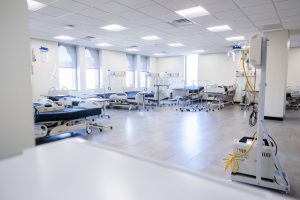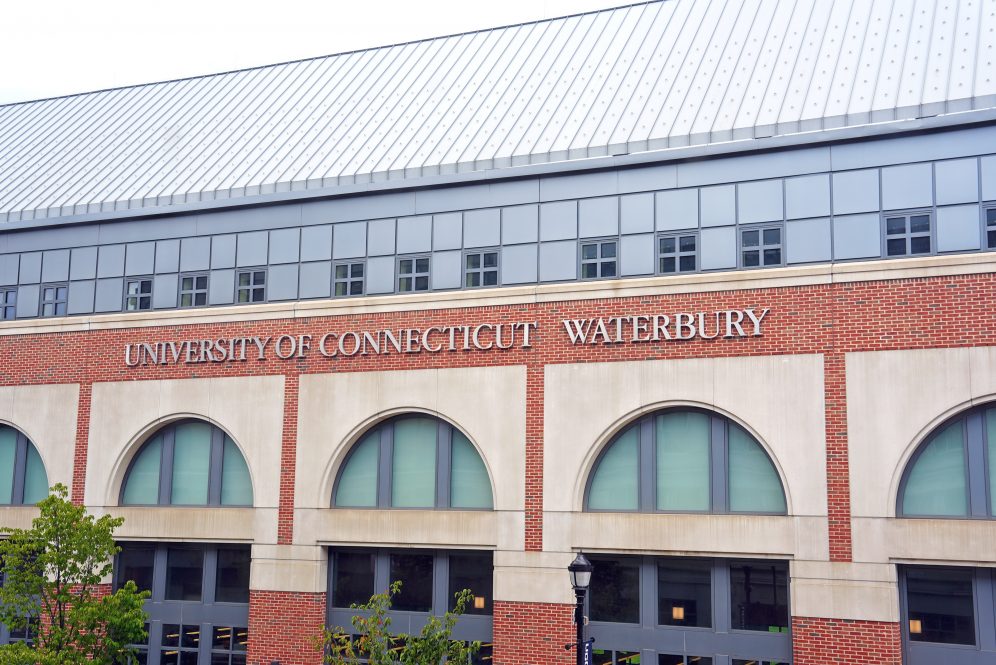UConn Waterbury’s local footprint is growing significantly with the expansion of several of its academic, research, and administrative operations into a historic building adjacent to the downtown campus.
The six-story building at 36 N. Main St. has undergone extensive renovation by Green Hub Development III, LLC., which is leasing about 26,300 square feet to UConn to expand the University’s offerings in nursing, allied health, and other programs.
UConn has been moving equipment and furnishings into the building and started using some of the space already over the winter, with the rest to be occupied starting later this month.
They include clinic-style nursing and health care simulation rooms, research facilities, study lounges, office and administrative space, a spacious former banquet room, and other areas suitable for maker space, incubator studios, classes, and large gatherings.
UConn’s plan to expand its nursing education programs into the building is particularly noteworthy given the high demand in that profession, both statewide and specifically in Waterbury and the Naugatuck Valley region.
“UConn Waterbury’s expansion into this historic space is an investment in our students, faculty, and the greater community,” says Fumiko Hoeft, UConn Waterbury’s campus dean and chief administrative officer, and a neuroscientist and UConn professor of psychological sciences.

“With the new facilities, we are strengthening our role as an educational and economic driver in the Naugatuck Valley,” she says. “We are honored to be part of this building’s next chapter. Its transformation aligns with our commitment to innovation, workforce development, and community partnerships.”
The growth of UConn Waterbury’s campus and academic offerings complements the UConn Strategic Plan, which includes ensuring that the campuses in Waterbury, Hartford, Stamford, and Avery Point offer signature programs that are destinations within UConn.
“The spirit of every UConn campus is unique, and we are looking closely at their academic offerings and facilities to best build on those strengths and opportunities, in alignment with our university-wide strategic plan,” says Anne D’Alleva, UConn’s provost and executive vice president for academic affairs.
“At UConn Waterbury, the new space fits perfectly with that vision,” she adds. “Our academic programs and research will grow and thrive there, and further underscore UConn’s role as a core element of this richly diverse, innovative city and region.”
UConn’s Board of Trustees approved the expansion plans in 2023, which are part of a larger commitment to strengthen the University’s presence and partnerships in the Naugatuck Valley.
They include UConn’s deep involvement in the Waterbury Promise scholarship program, under which many dozens of Waterbury graduates are attending the University; and the establishment and growth of the allied health sciences major on the campus.
UConn Waterbury also prides itself on providing a tight-knit community that serves students’ individual needs while ensuring they can access world-class UConn programs in undergraduate and graduate-level fields that lead to strong, satisfying career paths.
“The demand for skilled professionals is higher than ever. UConn Waterbury’s expansion directly aligns with our mission to prepare students for high-demand careers, ensuring that our regional workforce remains strong and competitive,” says Cathy Awwad, president and chief executive officer of the Northwest Regional Workforce Investment Board (NRWIB).
UConn Waterbury’s new space in the building at 36 N. Main St. will also be ideal for serving current students while also advancing community partnerships with schools, the City of Waterbury, the regional business community, and other groups.
The six-story building, originally built for the local chapter of the International Order of Odd Fellows social group, is in a prime downtown location and dates to 1895.
Its renovation was funded through a state grant to the City of Waterbury along with Green Hub’s private funding. It was modernized for today’s needs while retaining key elements of its history, including Venetian Gothic exterior features overlooking the Waterbury Green and the ornate ceiling in its former banquet hall.
“This project has been years in the making, and seeing it come to life is a testament to UConn’s commitment to Waterbury and the region,” says former Waterbury Mayor Neil O’Leary, who was deeply involved in the project and other partnerships with the University during and after his time in office.
“This expansion is more than just a physical footprint; it’s an investment in the next generation of healthcare professionals, entrepreneurs, and community leaders,” he says.
The building is around the corner from UConn Waterbury’s East Main Street location, with easy access between the back courtyard of the campus and an entrance to the newly leased space.
It will house clinical simulation spaces, clinical and cognitive neuroscience research dry and wet laboratories, a maker space, and an incubator studio.
It will also provide resources for humanities and social sciences, including the HACER Lab, a hub for humanistic inquiry, research, and pedagogy developed in collaboration with Waterbury students and community partners, the Ideas + Impact initiative and other learning communities focused on social impact, sustainability, and health-related projects.
These facilities will be used by programs in nursing, allied health, psychological sciences, urban and community studies, humanities and social sciences, business, and community partnerships.
Additionally, it will serve as the home for the Haskins Global Literacy Hub, a newly formed partnership between Yale, UConn Global Affairs, and UConn Waterbury focused on promoting education and conducting cutting-edge research to enhance literacy globally.

“Having UConn expand in downtown Waterbury strengthens our local economy, creates new opportunities for students, and enhances the city’s reputation as a center for education and innovation. This project is a great example of how partnerships between the city, state, and private sector can drive meaningful change,” Waterbury Mayor Paul Pernerewski says.
Programs and activities in the space will also advance UConn Waterbury’s connections with local schools and others as a location for community events.
For instance, on a recent morning, scores of local high school students visited UConn Waterbury for the kickoff of the Waterbury Robotics Institute to be based at the campus. The initiative, a collaboration with First Robotics, will bring students from the city’s high schools and middle schools to campus to work on projects with their peers, UConn students, and UConn faculty mentors.
They were among the first to use the newly leased space at 36 N. Main St., with several of the student groups testing and demonstrating their robots in the large collaborative learning room on the building’s second floor.
“This expansion will have a lasting impact not only on UConn students, but also on Waterbury’s middle and high schoolers who aspire to pursue careers in healthcare, technology, business, and other growing fields,” says Waterbury Public Schools Interim Superintendent Darren Schwartz.
“The increased access to cutting-edge learning spaces and mentorship opportunities will strengthen our student college and career readiness,” he says.
The Odd Fellows Building has a rich history in the City of Waterbury, and its restoration and use by UConn carries strong emotional and economic significance to the area.
Built at a cost of $100,000 and said to be among the finest of its time in the region, the building’s opening in 1895 drew more than 5,000 members of the group from around the East Coast and was featured in the New York Times.
In fact, the opening was marked by a parade and the event was so important to the city that all factories and schools were closed for the day, and all business shut down at noon, according to another Times article.
A clothing store occupied the first floor for about its first five years in addition to the meeting rooms and social spaces used by the Odd Fellows and others on the higher floors. Later, the popular Grieve, Bissett & Holland department store was in the building from 1902 until the mid-1960s.
The structure had been unused for more than 15 years before the renovation.
“Restoring this landmark building and giving it a new purpose has been incredibly rewarding,” says Joe Gramando, Green Hub’s managing partner. “UConn’s presence here ensures that this space will remain a vibrant part of Waterbury’s future, serving students, researchers, and the broader community for years to come.”



